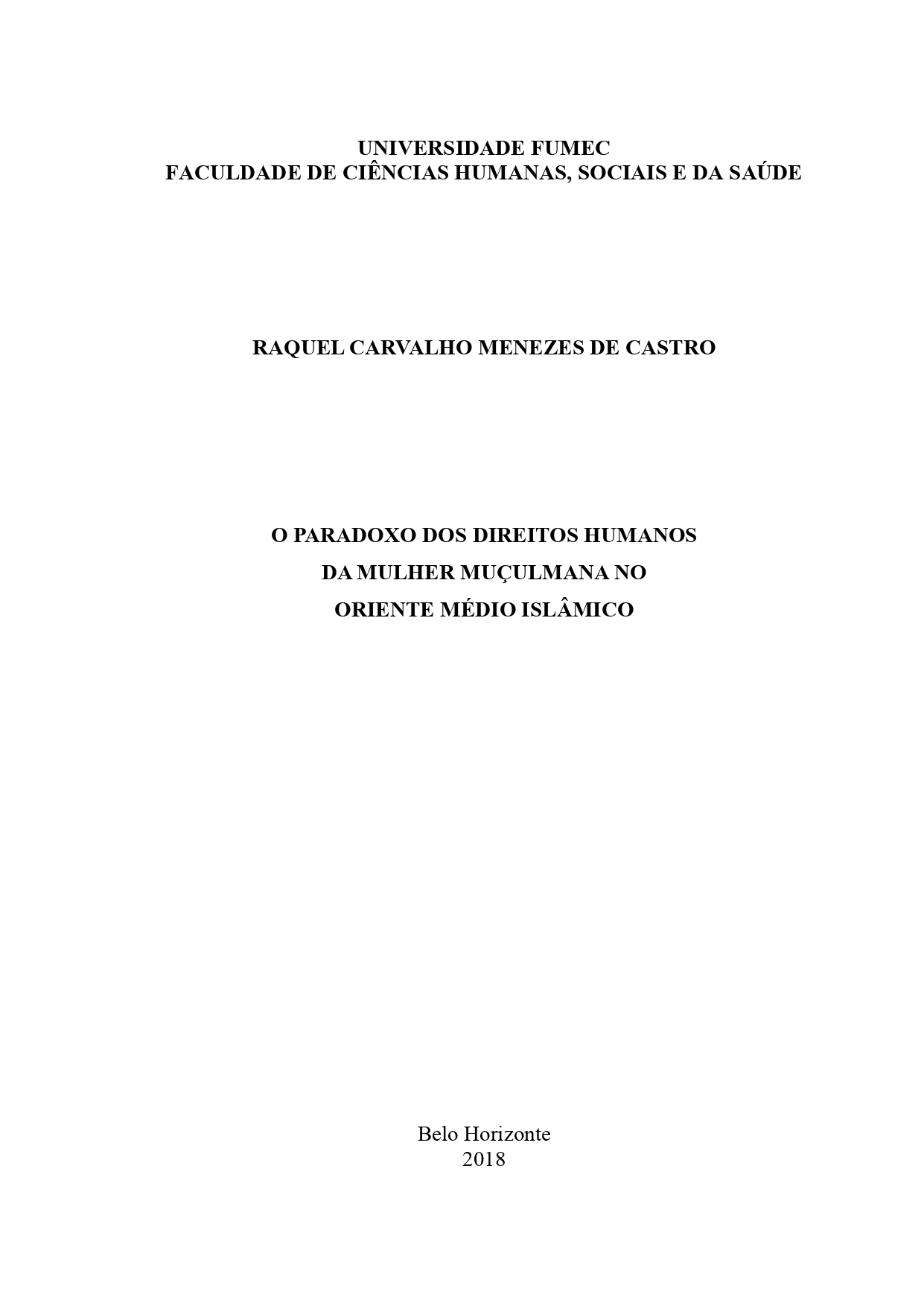O paradoxo dos direitos humanos da mulher muçulmana no oriente médio islâmico

Visualizar/
Data
2018Autor
Menezes, Raquel Carvalho
xmlui.mirage2.itemSummaryView.MetaData
Mostrar registro completoResumo
As ciências sociais e humanas têm estudado cada vez mais sobre a construção social dos
sujeitos e às diversas experiências pelas quais passam as sociedades nesse processo de
construção. Esse estudo torna-se ainda mais relevante quando em jogo um grande desafio da
humanidade proposto pelo diálogo inter-religioso. O tema-problema deste trabalho científico
é o paradoxo dos direitos humanos da mulher muçulmana no Oriente Médio islâmico. Nesse
prisma, esta pesquisa pretende contribuir para melhor entendimento da perspectiva do Oriente
Médio islâmico quanto aos direitos humanos, notadamente os direitos humanos da mulher
muçulmana. A delimitação do objetivo geral desta pesquisa cinge-se na análise do Princípio
da Subjetividade como marco da Modernidade ocidental, pressuposto dos direitos humanos, e
a relação existente com Oriente Médio islâmico. Para tanto, pretende-se expor o eixo histórico
ocidental, tratando dos precedentes históricos da Modernidade. Na esteira do entendimento de
Hegel e Habermas, o Cristianismo será tratado como marco temporal inicial, seguido da
Reforma Protestante, da Revolução Francesa e do Iluminismo. Na sequência, a partir de
entendimento de Hegel, Habermas e Borradori, se propõe a esclarecer o Princípio da
Subjetividade como marco preciso da Modernidade, momento de ruptura com o passado em
que o indivíduo é independente da autoridade. Em seguida, se propõe a demonstrar a
fundamentação das ordens jurídicas modernas sobre direitos subjetivos e como pressupostos
que deram desenho e conteúdo determinantes aos direitos humanos, apresentados sob a
perspectiva habermasiana de que a concepção dos direitos humanos foi a resposta européia às
consequências políticas da cisão confessional. Paralelamente, busca-se expor o aporte
histórico do Oriente Médio e da sua religião predominante, o Islã. Apresenta, também, os
aspectos característicos e pilares da religião criada por Maomé. Finalmente, identifica a
condição da mulher muçulmana no Oriente Médio islâmico. Nesse cenário, é percebido o
enfrentamento de duas teologias políticas, assim colocado por Derrida e procede-se à
investigação da relação existente entre direitos humanos e o Islã, especificamente, dos direitos
humanos da mulher muçulmana no Oriente Médio islâmico. Utilizou-se da pesquisa
bibliográfica e do método jurídico-dedutivo, partindo-se de uma perspectiva macroanalítica
para uma concepção microanalítica acerca da temática e, por fim, como procedimento técnico,
a análise da questão teórica e interpretativa. The social and human sciences have increasingly studied the social construction of the
subjects and the diverse experiences through which societies pass in this process of
construction. This study becomes even more relevant when at stake a major challenge of
humanity proposed by interreligious dialogue. The problem theme of this scientific work is
the paradox of the human rights of Muslim women in the Islamic Middle East. In this
perspective, this research aims to contribute to a better understanding of the Islamic Middle
East's perspective on human rights, especially the human rights of Muslim women. The
delimitation of the general objective of this research is girded in the analysis of the Principle
of Subjectivity as a landmark of Western Modernity, a presupposition of human rights, and
the existing relationship with the Islamic Middle East. To do so, we intend to expose the
Western historical axis, dealing with the historical precedents of Modernity. In the wake of
Hegel and Habermas's understanding, Christianity will be treated as the initial time frame,
followed by the Protestant Reformation, the French Revolution, and the Enlightenment.
Following, on the understanding of Hegel, Habermas and Borradori, he proposes to clarify the
Principle of Subjectivity as a precise framework of Modernity, a moment of rupture with the
past in which the individual is independent of authority. It then proposes to demonstrate the
rationale of modern legal orders on subjective rights and as assumptions that gave design and
content that are determinant to human rights, presented presented under the Habermasian
perspective that the conception of human rights was the European response to the political
consequences of the confessional split. At the same time, it seeks to expose the historical
contribution of the Middle East and its predominant religion, Islam. It also presents the
characteristic aspects and pillars of the religion created by Muhammad. Finally, it identifies
the condition of the Muslim woman in the Islamic Middle East. In this scenario, it is
perceived that two political theologies are confronted, as Derrida puts it, and the investigation
of the relationship between human rights and Islam, specifically, of the human rights of
Muslim women in the Islamic Middle East. It was used the bibliographic research and the
legal-deductive method, starting from a macroanalytical perspective for a microanalytical
conception about the thematic and, finally, as a technical procedure, the analysis of the
theoretical and interpretative question.
